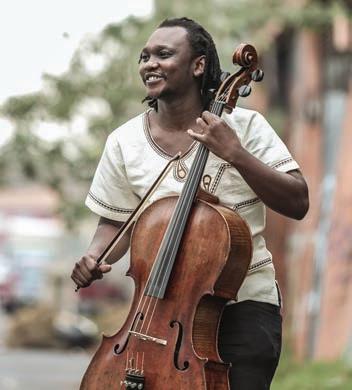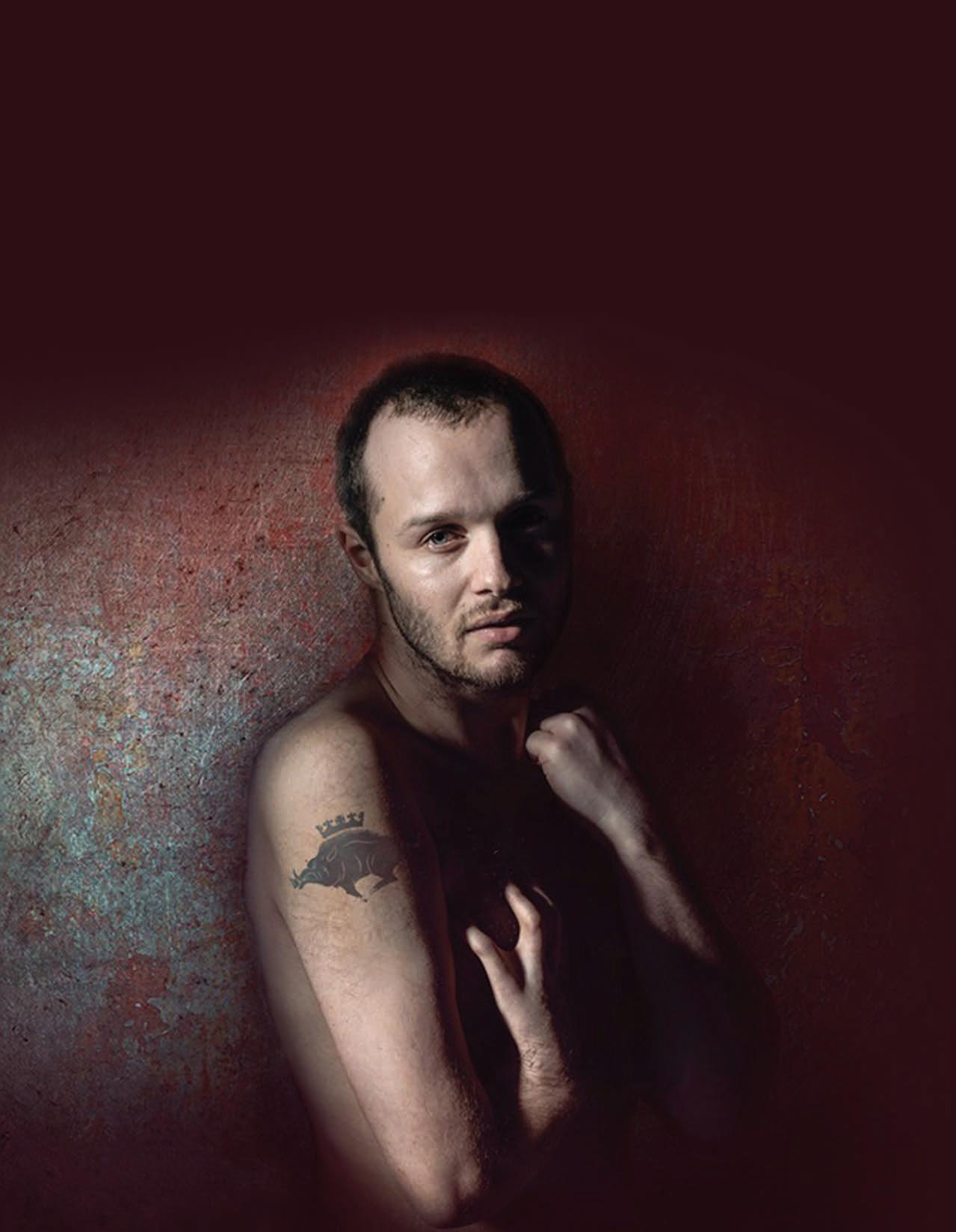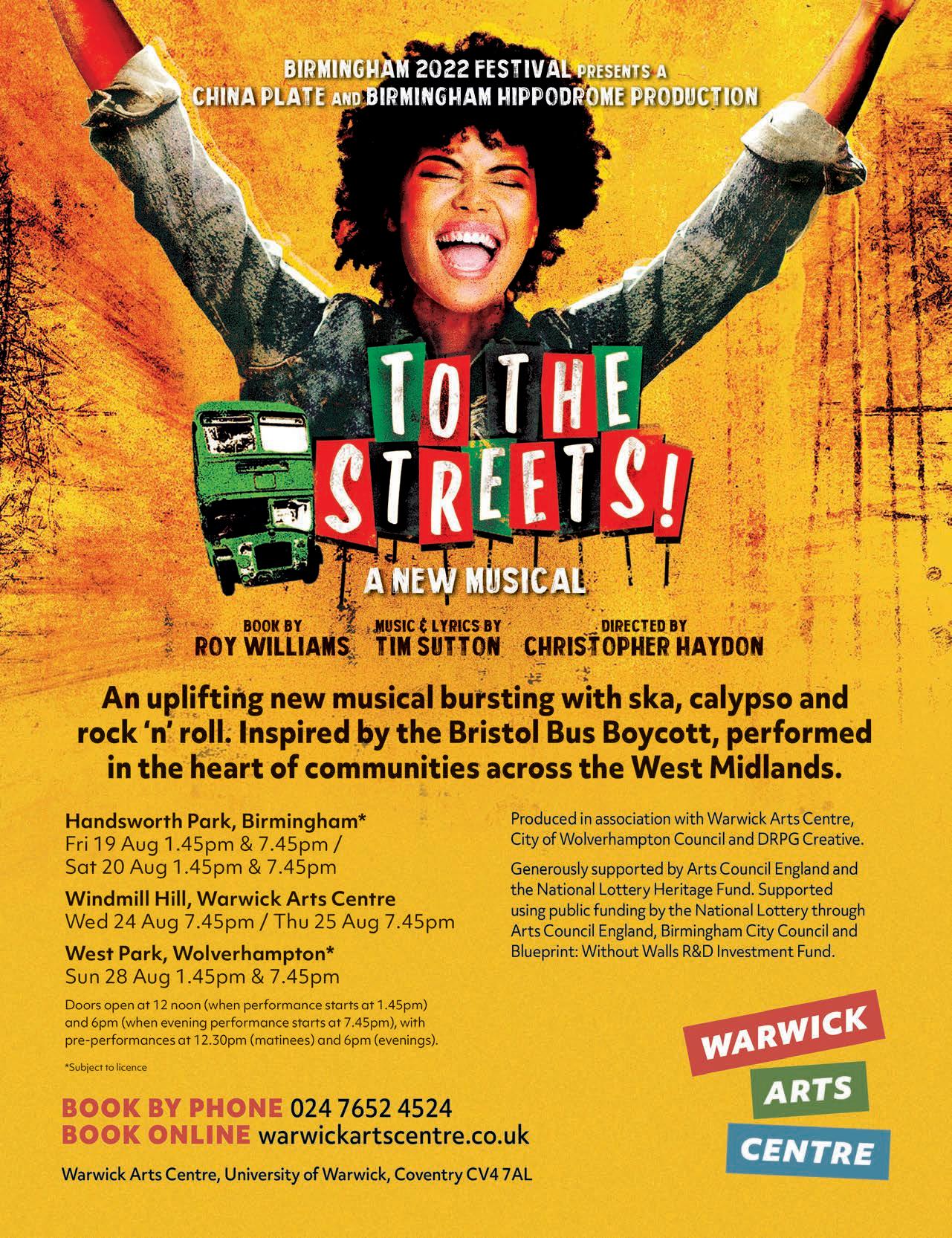
8 minute read
Gigs
Live music from across the region...
Rammstein
Advertisement
Coventry Building Society Arena, Sun 26 June
Rammstein are a Berlin-formed pyromaniac nu-metal band whose trademark stage show includes flames, lasers and gimmicks galore. Fronted by lead vocalist Till Lindemann, the band’s line-up has remained unchanged throughout their 28-year history. Something else which has also stood the test of time is their approach to songwriting, with Lindemann writing and singing the lyrics over instrumental pieces the rest of the band have completed beforehand.
Abel Selaocoe
Warwick Arts Centre, Coventry, Fri 17 June
Genre-busting South African cellist Abel Selaocoe moves seamlessly across a plethora of genres and styles, from collaborations with world musicians and beatboxers, to concerto performances and solo classical recitals. Combining virtuosic performance with improvisation, singing and body percussion, Abel is the co-founder of both the Kabantu ensemble and the Chesaba trio, both of which have performed with partners from a variety of musical backgrounds.


Gigs

James Bay
Worcester Racecourse, Sat 11 June
For the best part of a decade, Hertfordshireborn James Bay has been one of the nation’s finest young singer-songwriters. The hit-maker behind multi-million-selling singles Hold Back The River and Let It Go has also enjoyed top-five album success with Chaos And The Calm and Electric Light. Headlining this Live After Racing event, James will be performing songs from his much-anticipated third album.
The Beat
hmv Empire, Coventry, Fri 17 June
Along with their contemporaries, The Specials, Madness and The Selecter, The Beat became an overnight sensation following the release of their debut single, an infectious cover of the Smokey Robinson classic Tears Of A Clown, which went straight into the UK national charts at number six. Having toured alongside artists such as The Clash, The Police and David Bowie, the legendary 2-Tone, ska and reggae group, led by vocalist Dave Wakeling, are here celebrating their 40th anniversary.
The Rezillos
The Assembly, Leamington Spa, Fri 10 June
Following their inception in 1976, The Rezillos ripped into the music scene through a shared love of ’60s garage rock. Although emerging at the same time as other punk rock groups, the band didn’t share the nihilism of their contemporaries, choosing instead to take a more lighthearted approach to their songs. Despite still touring, they’ve only ever released two albums - Can’t Stand The Rezillos in 1978 and Zero in 2015.
Sari Schorr
Huntingdon Hall, Worcester, Wed 29 June
Coming from humble beginnings working the music scene in the legendary South Bronx of New York and on Manhattan’s Lower East Side, Sari Schorr first burst onto the blues rock scene in 2016 with critically acclaimed debut offering A Force Of Nature, an album which was produced by iconic British blues pioneer Mike Vernon, who’s worked with the likes of David Bowie, Eric Clapton and Fleetwood Mac. With a career that’s going from strength to strength, the operatically trained tornado visits Worcester having recently been inducted into the New York Blues Hall of Fame.
The man who would be king

Arthur Hughes talks about starring in a ground-breaking new production of Richard III that marks the first time the Royal Shakespeare Company has cast a disabled actor in the title role.
Arthur Hughes described it as “a dream come true” when he found out he’d been cast as Richard III, one of the most murderous and despised characters in Shakespeare’s canon. But there was rather more to it than a desire to play the villain, even though he admits that was a big part of it. “It’s great fun to play the bad guy!” he laughs. “Bad people are interesting to play because I don’t believe people are inherently bad. You’re a product of the atmosphere and environment you grow up in, and Richard gets a bad rep if he did all the things they say he did in history. “Certainly in the play he’s very bad, but he’s a product of an environment that breeds that, and he’s characterised as an inherent villain because of his shape and because he’s disabled, and that hangover has pervaded our culture for the last 500 years. ‘Deformed in body, deformed in mind’ is the old Elizabethan philosophy, which we know is absolute nonsense. “But when people think of villains they think of Richard III, and they think hunchbacked, crooked, deformed… and that means evil. Those words are all horrible, and in modern terms the way we think of disabled people has changed, but they are still often portrayed as villains.” Arthur has another good reason to be pleased about playing the crippled king (whose unearthed skeleton displayed curvature of the spine but no ‘withered hand’ as per the Bard’s other description), since he himself is disabled. The actor, who identifies as ‘limb different’, was born with a condition known as radial dysplasia, which affects one in 30,000 people. He has no thumb or radius bone on his right arm, and his right wrist is disfigured. His delight at winning the role - he made his RSC debut as Richard, Duke of Gloucester, in this spring’s Wars Of The Roses - is tempered by a recognition of the ongoing battle faced by disabled actors. “I’m thrilled not only to be playing this title role at the RSC, but also that a major production of this play is putting disability centre stage. It’s sadly rare in many plays to find a leading disabled character, and with this production I hope we prove that disabled talent deserves to be in the spotlight.” Arthur is best known for his role as Ryan McDaniel in Netflix’s The Innocents and last year starred in Channel Four care-home drama Help, with Jodie Comer and Stephen Graham. He argues that having disabled actors playing disabled characters brings an authenticity to a production, as “only they understand what it is to be different and ‘other’ - looked at differently and treated differently”. Not having to affect any form of disability also means he can concentrate on other aspects of his performance as well as understand Richard and the world he lived in. “The play is set in a very cruel, patriarchal ableist world - as are most of Shakespeare’s plays, because that was the world at the time - but I think I can see it much clearer. You don’t have to labour on what you think life is like for a disabled person, it’s just your truth.” The new production will be the last to be helmed by the RSC’s outgoing artistic director, Gregory Doran, and is especially poignant in the wake of his husband Antony Sher’s death last year. Sher’s 1984 performance as Shakespeare’s ‘bottled spider’ is widely regarded as the greatest ever seen. “It’s obviously quite a poignant production for Greg to be doing Richard so soon after losing Tony,” agrees Arthur. “But Greg himself has spoken about this - it’s nearly 40 years since Tony’s performance, which by today’s standards couldn’t and shouldn’t happen. “The representation of disabled people is getting better, so even though [Tony’s portrayal] has gone down in history as one of the great performances, I’m glad history has moved on so we hopefully won’t see those type of performances where non-disabled actors play disabled parts. “It’s a great reclaiming, I think, and hopefully this will be the first of many around the world where we see major largescale productions with a disabled Richard.” Arthur sighs when I say it shouldn’t be a big deal for a disabled actor to be playing a lead role in 2022, but his casting has been a big part of the hype surrounding this production. “I know. And not just because it’s Richard you just don’t see many leading disabled actors, full stop. It’s great to have Richard III reclaimed, but why not a disabled Macbeth, Hamlet, Iago or Othello? “That’s the next step. It’s great to have the most famous disabled character in the English-speaking language, or at least one of them, being played at the Royal Shakespeare Company by a disabled actor, but the next step is casting other leading roles where the disability is just incidental.” Like when deaf actor William Grint was brilliant (and hilarious) as the second merchant in the RSC’s acclaimed production of A Comedy Of Errors last year… “Yeah, William’s a great actor. But that’s exactly it - this kind of integration within productions doesn’t need to be ‘oh we’re a disabled production now’. There should be fully disabled-led productions as well, of course, but it’s more about integration and incidental characters as well as telling disabled stories. Being there is telling a story in itself.” Speaking of telling stories, Arthur has got to see the entire story arc of Richard, having portrayed him in Wars Of The Roses, the final part of the Henry VI trilogy and effectively this play’s prequel. “I feel so lucky to play Richard in both of these plays. It’s a real gift for an actor to play both, because so much of Wars Of The Roses’ story unlocks who he is in Richard III and you really see his rise to power.” The corruption, lies and deceit that facilitate Richard’s unscrupulous ascent to the throne draw a number of parallels with the modern world, making the play as alarmingly relevant today as it’s ever been. “Leaders who are patently unsuitable for power are the ones that power always attracts,” suggests Arthur. “Look in our country, Russia, America, almost anywhere the upper echelons of power are always full of the same type of people, doing the same type of things. If you wrote Boris Johnson as a character in a play, no one would believe that it could be a real person! “But these people are fascinating to behold, and the similarity between Shakespeare’s characters and real-life politicians is the entertaining and frightening thing. And it’s why these plays can be done over and over again, because they always have something to say about what’s going on.”

Richard III runs at the Royal Shakespeare Theatre from Thursday 23 June to Saturday 8 October.









